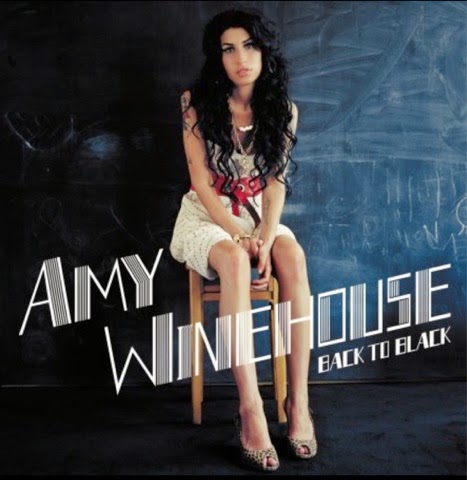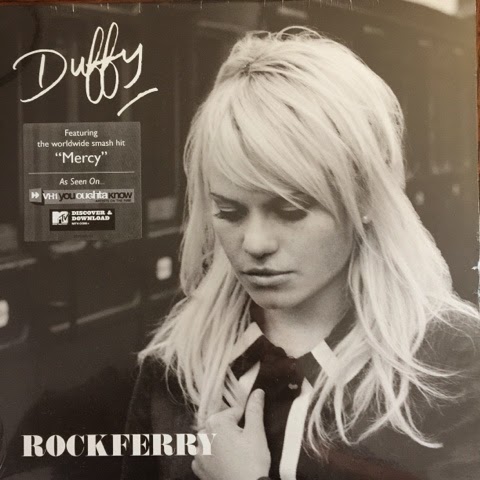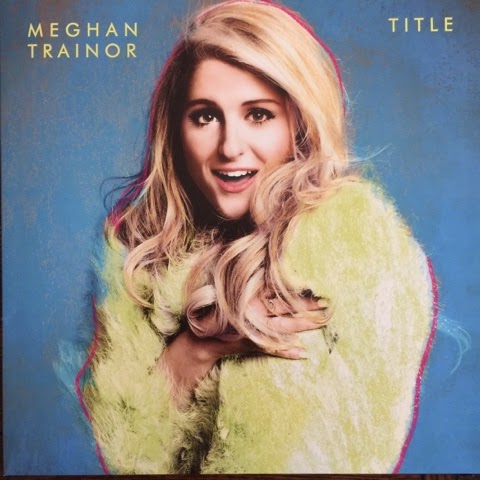So far one of the biggest pop hits of 2015 is Uptown Funk by Bruno Mars and Mark Ronson. Of course considering the song hit the charts so early in the year, time will tell if it actually makes it to becoming a summer anthem or not. If you know the song though you have to admit it's extremely catchy, easy to dance to, and is just a fantastic feel good song that could easily be a summer hit.
The song Valarie, as well as most of Amy Winehouse's Back To Black album have become a soundtrack to many a Friday or Saturday night spent relaxing over a few beers or glasses of wine at my house. The ruckus nature of Monday through Thursday night's might demand the more upbeat sound pop music can bring us, but Fridays demand a smoother and slightly more somber sound that relaxes the muscles and adds a capstone to the stress bought on by the weekdays. So its not uncommon for us to set Pandora to the Adele station while we eat dinner and indulge in a few hours of conversation afterword. Of course there where many a night I found myself rushing to look at Pandora to see who was singing, and long behold it was usually Winehouse, and usually something off Back To Black.
I have to admit that this was something that caught me off guard since I was never really into Winehouse's music when she was alive. I know that sounds weird but lets be honest back in 2007 Winehouse's Rehab, was one of those songs that was so overplayed you found your hand heading for the radio dial to turn it off within the first few beats. Of course for me the aversion to her and her music was only magnified by her personal life being in the news all the time as Winehouse and her husband found themselves in one drug related scrap after another until her death in 2011. Once the sensationalism of Winehouses death had passed though, the media quickly forgot about her and just added her to the "Left us too Young" roster they so often do. With that said though her music has become an acquired taste for me, and even something I can identify with despite my past misgivings.
Although, Winehouse's influence initially impacted her fellow U.K. artist, her sound did catch on in the United States. Artist such as the previously mentioned Bruno Mars, and my personal favorites Nick Waterhouse and Meghan Trainor all have sounds that are in part influenced by Winehouse's work, but have also seen success based on grounds paved by Winehouse. Listeners appetites for Waterhouse's late 50's and early 60's American R&B sounds, and Mars, Trainor, and even Olly Murs (U.K) 1950's rock and Doo-Woop influences, where developed by what listeners where given in 2007 by Winehouse and Back To Black.
Although its influence on artist has become more and more prominent over the last few years, the direct impact Back To Black would have on listener's was slightly more subtle. Winehouse's and Back To Black's sound arrived at the right time, it was a more traditional pop sound that had come a long during a time when mainstream pop music was begining to feel a little too canned. The mixture of auto-tune, singing teen TV stars, and mid-song rap intrusions had made modern pop music laughable and sent most of us longing for something with substance running to satellite radio, and our iPods. When Rehab arrived on top 40 stations it gave us a reminder as to how music use to sound, and made most of us recall the music our parents listened to and harkened us back to the days of Aretha Franklin, The Temptations, Burt Bacharach, and vinyl records. Sadly, though as previously mentioned Rehab was played ad nauseam till some of its charm was lost, but the sound remained and obviously wasn't forgotten. It only seems fitting that as vinyl would come back so would a form of music that had dominated the medium two generations before, and Back To Black would a quintessential album to do that with.
I'm not going to end this posting by claiming that Back To Black is one of the most influential albums of the 21st century so far. I am however, going to end by saying that time will tell especially considering the albums reach into current music. Back To Black and Amy Winehouse are obviously as of now, somewhat of a footnote in music history even though Back To Black is a popular title amongst vinyl collectors of current generation music. So the question is as the album continues to sell and catch on in the vinyl medium despite its creator having passed on, what further impact will it have as its discovered by new listeners?
So one day while messing around on YouTube, I came cross the video for Uptown Funk and decided to go ahead and watch it. To say the least I wasn't disappointed, the video turned out to be as fun as the song itself was. Of course YouTube being YouTube you find yourself quickly lead to other videos based on what you just watched and I was given the option of watching some additional Bruno Mars videos or some of Mark Ronson's additional work. I will openly admit that of course I had to watch Bruno Mars video for The Lazy Song, but after that I decided to check out some of Mark Ronson's work. I very quickly came across the video for Valarie, a song Ronson had collaborated with Amy Winehouse on back in 2007. The video is unique though in that it was produced posthumously after Winehouse's death and although it features her vocals the video does not feature her but rather a group of young women "The Wine-ettes" lip syncing the song while on stage. Although I really liked the video itself particularly the very attractive "Wine-ettes", what I liked more about it was the song itself one I had come to love hearing over the past year.
The song Valarie, as well as most of Amy Winehouse's Back To Black album have become a soundtrack to many a Friday or Saturday night spent relaxing over a few beers or glasses of wine at my house. The ruckus nature of Monday through Thursday night's might demand the more upbeat sound pop music can bring us, but Fridays demand a smoother and slightly more somber sound that relaxes the muscles and adds a capstone to the stress bought on by the weekdays. So its not uncommon for us to set Pandora to the Adele station while we eat dinner and indulge in a few hours of conversation afterword. Of course there where many a night I found myself rushing to look at Pandora to see who was singing, and long behold it was usually Winehouse, and usually something off Back To Black.
I have to admit that this was something that caught me off guard since I was never really into Winehouse's music when she was alive. I know that sounds weird but lets be honest back in 2007 Winehouse's Rehab, was one of those songs that was so overplayed you found your hand heading for the radio dial to turn it off within the first few beats. Of course for me the aversion to her and her music was only magnified by her personal life being in the news all the time as Winehouse and her husband found themselves in one drug related scrap after another until her death in 2011. Once the sensationalism of Winehouses death had passed though, the media quickly forgot about her and just added her to the "Left us too Young" roster they so often do. With that said though her music has become an acquired taste for me, and even something I can identify with despite my past misgivings.
This newly found enjoyment of her music made me want to explore everything Back To Black had to offer, and what I found surprised me. Back To Black not only cradled Rehab, but also Valarie (B-sides) and the albums haunting title song Back To Black. However, the albums deep tracks are also highly stunning and offer us a chance to hear the fusion of modern pop sounds blended with classic R&B, that form the basis of Winehouse's signature sound. The album is soulful, moody, and even a bit dark at times but all that is set against the juxtaposition of a sound reminiscent of 1950s and 60s R&B and Motown melodies and beats.
The end product of Back To Black is a type of music that I would not only call unique but also highly influential. Back To Black particularly on vinyl would not only change listeners taste and reception to this type of music, but would also have an influence on artist that would follow Winehouse into the movement towards a classic R&B revival. In 2008 only a year after Back To Black's release we would see Duffy release her Rockferry, and Adele release her 19. Both albums and artist are heavily classic R&B influenced and take a serious cue from Winehouse, with Duffy giving us a sound more faithful to 1960's R&B and Motown, and Adele giving us a mix of classic R&B and Pop. Adele's follow up album 21 released in 2011, and recording of Skyfall in 2013 for the James Bond film of the same name would further hone her sound, and expand upon Winehouse's and Back to Black's early influence.
Although, Winehouse's influence initially impacted her fellow U.K. artist, her sound did catch on in the United States. Artist such as the previously mentioned Bruno Mars, and my personal favorites Nick Waterhouse and Meghan Trainor all have sounds that are in part influenced by Winehouse's work, but have also seen success based on grounds paved by Winehouse. Listeners appetites for Waterhouse's late 50's and early 60's American R&B sounds, and Mars, Trainor, and even Olly Murs (U.K) 1950's rock and Doo-Woop influences, where developed by what listeners where given in 2007 by Winehouse and Back To Black.
Although its influence on artist has become more and more prominent over the last few years, the direct impact Back To Black would have on listener's was slightly more subtle. Winehouse's and Back To Black's sound arrived at the right time, it was a more traditional pop sound that had come a long during a time when mainstream pop music was begining to feel a little too canned. The mixture of auto-tune, singing teen TV stars, and mid-song rap intrusions had made modern pop music laughable and sent most of us longing for something with substance running to satellite radio, and our iPods. When Rehab arrived on top 40 stations it gave us a reminder as to how music use to sound, and made most of us recall the music our parents listened to and harkened us back to the days of Aretha Franklin, The Temptations, Burt Bacharach, and vinyl records. Sadly, though as previously mentioned Rehab was played ad nauseam till some of its charm was lost, but the sound remained and obviously wasn't forgotten. It only seems fitting that as vinyl would come back so would a form of music that had dominated the medium two generations before, and Back To Black would a quintessential album to do that with.
I'm not going to end this posting by claiming that Back To Black is one of the most influential albums of the 21st century so far. I am however, going to end by saying that time will tell especially considering the albums reach into current music. Back To Black and Amy Winehouse are obviously as of now, somewhat of a footnote in music history even though Back To Black is a popular title amongst vinyl collectors of current generation music. So the question is as the album continues to sell and catch on in the vinyl medium despite its creator having passed on, what further impact will it have as its discovered by new listeners?




